Greetings, dear friends, it's another week in the Steemit Learning Challenge, and I'm delighted to join the contest organized here by @ashkhan. This is the first time I'm participating in this contest for this season as I found this course very interesting.
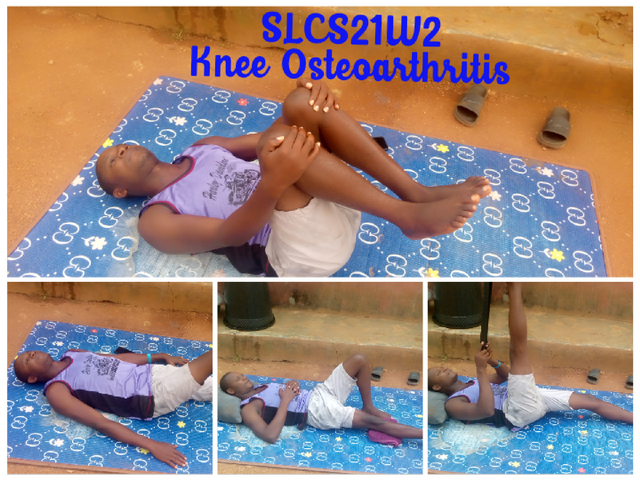
Going through the lecture and the videos, I have learned a lot about Knee Osteoarthritis and the different exercises needed. After carefully reading and understanding the course I want to share my participation by attempting the questions below. Please read till the end and also endeavor to go through the various videos to see how I practiced what I have learned from the course.
| What's knee OA? Write in your own words after getting knowledge from the lesson post. |
|---|
One of the most known joint diseases we have today is Knee osteoarthritis (OA). Osteoarthritis is a degenerative joint disease that occurs as a result of wear and tear of the protective cartilage. Osteoarthritis is associated with arthritis, which means that people develop this form of illness as they continue to age. Aside from aging, other factors can cause this form of sickness, such as joint injury, repetitive stress on the knee, obesity, and many more.
There are 3 key features of Knee Osteoarthritis, that include Cartilage Breakdown, Bone Changes, and Joint Inflammation. I will discuss these three features briefly for a better understanding.
Cartilage Breakdown: Cartilage that is found within the bone gradually breaks down, and when this happens, we will notice pain, stiffness and, since the cartilage is not there any longer to support the bone, the movement of the joint will also reduce. Hence, cartilage breakdown leads to a decrease in mobility of the joint.
Bone Changes: Due to the breakdown of the cartilage, as explained above, you will also notice that the bones will interface with each other thereby rubbing themselves together, and when that happens, the individual will feel severe pain and may also cause osteophytes.
Joint Inflammation: Inflammation of the joint is also noticed alongside swelling of the knees. When this gets serious, the entire joint will lead to more pain and there will be complete discomfort to anyone having such.
Based on the features we have discussed above, we can as well deduce the symptoms associated to Knee Osteoarthritis and in my little knowledge I believe the common symptoms one can notice, see of feel include pain, stiffness, swelling, reduce movement and Grating Sensation.
All of the above mentioned symptoms are seen or felt during or after movement or when you may not have moved for a while. In all, you will be in pain throughout your stay as a person.
Also, since we have the symptoms that we see or feel when we have this disease, it is important to mention some treatments that can help relieve the pain that those suffering from this feel.
Before sharing the pain management for knee osteoarthritis, it is important to mention here that there is no specific remedy for this illness; hence, all you need to do is apply a pain management approach to reduce the pain one is feeling.
So, some of the main pain management you can use to reduce joint pain include medications, which include taking pain relievers using supportive devices like braces to minimize the strain or strain of the joint, or possibly one can opt for surgery if the case is severe.
| How would you diagnose a knee OA? Any clinical investigation or assessment tests? |
|---|
Based on the lecture given and a little research I have done, I have discovered that to carry out a proper diagnosis of knee osteoarthritis, one needs to take the following major steps, including Patient History, Physical Examination, and Imaging Tests.
Patient History: The first thing to take into consideration when carrying out knee OA diagnosis is to check the patient history and this history should include symptoms that the patient often has, his or her medical history with regards to knee injuries or joint pains as well as family history on osteoarthritis then lastly, the patient age. Age is important because this illness is common among older people.
Physical Examination: Here, the patient is observed by the doctor to check for possible visible signs to aid him in determining the illness. Aside from the observation, the doctor also checks for Palpation and motion of the knee and sees if there are pains or swelling around the area and if the muscles are weak or stronger.
Imaging Tests: After the first two, if the doctor is still not setting, then the third stage is to check x-rays, MRI and Ultrasound. So X-rays are the number one imaging done, and if they are not certain, then they move to MRI and so on.
Knee osteoarthritis is diagnosed using the three procedures or steps I have listed above. When the doctor follows these steps then he or she will be able to determine if the user has such an illness or not.
| Try to practice at least 4 exercises that you have learned from the lesson. Share images, gifs, or videos while practicing. |
|---|
In this section I will be sharing with us the videos as well as the images of the 4 practicals I did which I learnt from the lecture given. Below are the exercises and their names.
Heel Slides Exercise
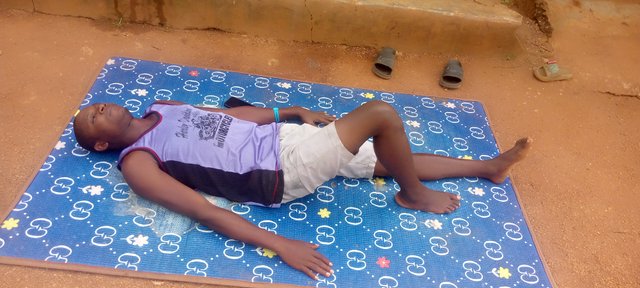
https://youtube.com/shorts/J5gDkwEMoaY?si=HL9y92mEmY7UzAqJ
Knee to Chest Exercise
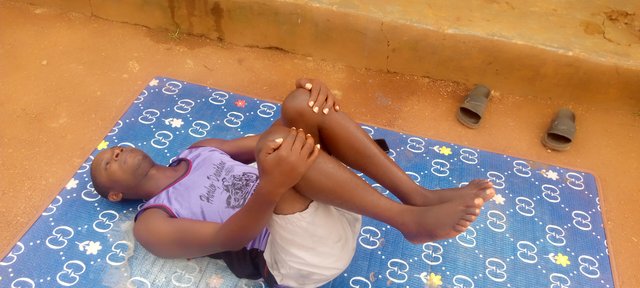
https://youtube.com/shorts/SMYCx_wRF-U?si=_8ar9PtascVMFbZJ
Knee Isometric
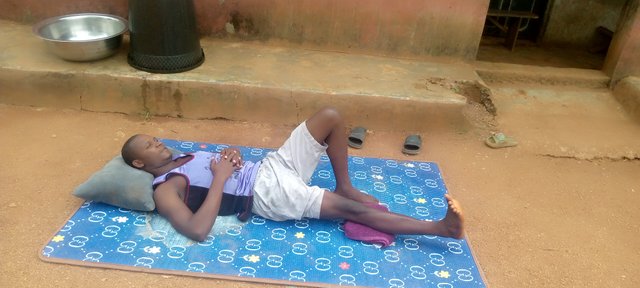
https://youtube.com/shorts/-YkuLP-PuT0?si=hbx-bzbAebTwCJju
Calf & Hamstring Stretch
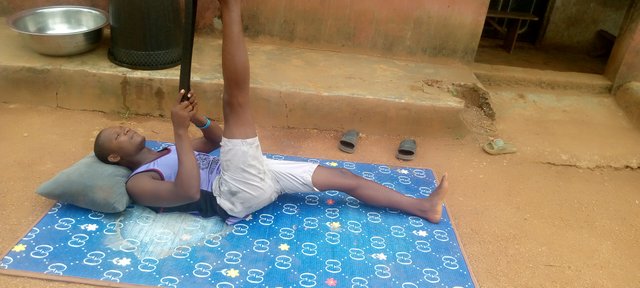
https://youtube.com/shorts/EKBqMeAOG34?si=M6tpORZFrjaA499b
| Share your review after performing these exercises either on a healthy individual or a patient. |
|---|
I performed this exercise on myself because I needed to know how every bit of the different knee exercise taught in the lecture works. In all the exercise I did that include the Calf & Hamstring Stretch, Knee Isometric, Knee to Chest Exercise & the Heel Slides Exercise I notice a similar thing and that is the stretching of the entire muscle of the knee.
I'm a physical fit young man and performing this exercise on myself helped me in no small way to strengthen my bones especially the one found on my knee. Also I notice that my chest bones also were strengthen when I performed the Knee to Chest Exercise.
Also in performing the Calf & Hamstring Stretch using the belt, I was able to Stretch my leg very well and it was as if all the weak muscles on the leg were given a new life after the exercise because I become more stronger on the leg and the stamina I started feeling became even more.
Finally I want to invite @josepha, @suboohi and @dove11 to also share their participation in this contest if they haven't done that already.

Thank you for understanding the lesson and sharing your assignment; I hope that you will enjoy this week's lesson and try to implement it in your life if you see any such case.
Observations
Task 1 (2.6/3)
You have shared a good knowledge about knee osteoarthritis and it's symptoms. But you have to add the types & stages or grades of knee OA too to better explain this to other users. A bit more depth require to complete the answer. I appreciate your effort.
Task 2 (2.5/3)
In the second question, you tell us about how you assess the patient with knee OA by doing the physical examination, history taking, investigations but you have to add 1 or 2 special tests that we perform while assessing knee OA patient. Good.
Task 3 (3.7/4)
You try the heel slides, calf & hamstring stretch, William Flexion ( knee to chest exercise), Knee Isometric ( Knee flexion ). While performing heel slides you have to keep your heel in contact with ground. Remember always apply heating pad before performing these exercises. I appreciate your efforts.
Overall you made a good attempt to answer all the questions. I appreciate your efforts. That's good you feel good after performing these exercises. But next time try to avoid the above written suggestions. Keep learning and try to implement your knowledge to the people suffering from any knee Osteoarthritis. Thank you.
Downvoting a post can decrease pending rewards and make it less visible. Common reasons:
Submit